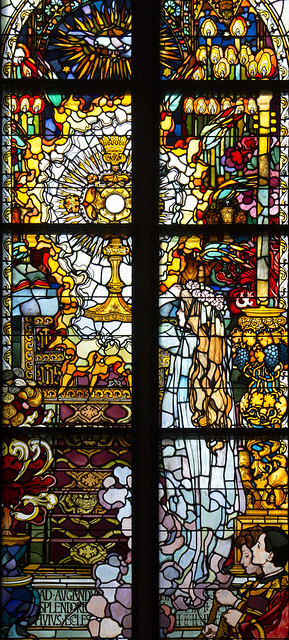 A little late for the feast of Corpus Christi, but reflections on the eucharist are always on time....
A little late for the feast of Corpus Christi, but reflections on the eucharist are always on time....From the the chapter on impairment as sign, in a reflection on the Incarnation as love, gift, and self-limitation of God:
...An even more exacting reality is the Eucharist as the chosen self-limitation of God. As modern desert father Carlo Carreto said, “Either Christ is a raving madman, or He is truly omnipotent and merciful Love, who has found the most direct road to our hearts, a road that will not frighten or scare us, a road that is as simple as could be.” Sharing his very life—body and soul, humanity and divinity--through the humble, sustaining consumption of transubstantiated bread and wine is as divinely self-limiting as one can possibly imagine. But do imagine, as Carlo Caretto does, what that tells us about God:
Why do you find it strange that I should have wanted to become bread through love?
Have you no experience of love?
When you have loved, really loved, have you not wanted to become bread for your beloved? …
You can argue about the Eucharist as much as you like, but on the day love really takes hold of you, perhaps you will understand that Jesus is not a fool or a madman.
To be able to become bread! To be able to nourish the whole world with his flesh and blood!
I am terribly selfish and fearful when faced with suffering, but it I could become bread to save all humanity, I would do it. If I could become bread to feed all the poor, I would throw myself into the fire at once.
If we cannot understand the eucharist through the strange logic of love, we cannot understand the incarnation. The eucharist is a natural extension of the Incarnation of God. It is also an extension of the law of love: “You shall not … stand by idly when your neighbor's life is at stake” (Lev 19:16).No, the eucharist is not something strange: It is the most logical thing in the world, it is the story of the greatest love ever lived in the world, by a man named Jesus.*
If love is to offer oneself to the other, the Eucharist makes perfect sense. The hermeneutic of the gift reaches its pinnacle in this reality, and it is why we organize our entire faith around it. The law of the gift is presented, taught, and realized in our offering and participation in the Eucharist.
* Carlo Caretto, The God Who Comes (Maryknoll, NY: Orbis Books, 1974), pg. 115-6.